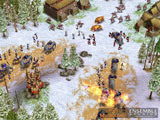 Ensemble
studios delivers a stylish new installment in the Age of Empires
series—the fantasy-rich Age of Mythology—among a multimillion dollar
media blitz worthy of Microsoft’s bankroll. You’ll probably catch an AoM
trailer during your Christmas season movie roundup. What you may not
catch amidst the glitter and showy animations is how fantastic an
addition AoM really makes to the AoK series.
Ensemble
studios delivers a stylish new installment in the Age of Empires
series—the fantasy-rich Age of Mythology—among a multimillion dollar
media blitz worthy of Microsoft’s bankroll. You’ll probably catch an AoM
trailer during your Christmas season movie roundup. What you may not
catch amidst the glitter and showy animations is how fantastic an
addition AoM really makes to the AoK series.
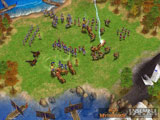 Those
familiar with the series will already know of its crossover style
between Civilizationesque resource- and knowledge-management on one hand
and strategy-based battle and conquer on the other. AoM brings to the
table a foray into the ancient mythology of three different
civilizations—Greeks, Norse, and Egyptians—by having players choose
deities in the various pantheons for their villagers to worship. As
always, once you pick sides in a conflict you find yourself involved in
all the petty wars and drama of the various deities. (Lucky for you the
deities grant god powers to help, which are specialized powers that may
be used only once per scenario and range from a lightning bolt that
destroys one unit to a healing spring or a shower of wrathful meteors.)
Getting mixed up in real holy wars is the premise of the 32-scenario
campaign, in which you guide Atlantis’s heroic admiral Arkantos through
an epic war against the hideous monster Gargarensis. At stake is the sea
god Poseidon’s favor and, of course, the free world itself, for
Gargarensis is working to open a passage to Hades and awaken sleeping
Kronos, which will trigger Armageddon, or Ragnarok, depending on your
point of view. Gargarensis enlists the help of Loki, which brings the
Norsemen running and brings Thor and Zeus into the fray. Egyptian hero
Amanra lends her support when Gargarensis turns to Set for help in
destroying the pieces of Osiris before he can be remade and given new
life.
Those
familiar with the series will already know of its crossover style
between Civilizationesque resource- and knowledge-management on one hand
and strategy-based battle and conquer on the other. AoM brings to the
table a foray into the ancient mythology of three different
civilizations—Greeks, Norse, and Egyptians—by having players choose
deities in the various pantheons for their villagers to worship. As
always, once you pick sides in a conflict you find yourself involved in
all the petty wars and drama of the various deities. (Lucky for you the
deities grant god powers to help, which are specialized powers that may
be used only once per scenario and range from a lightning bolt that
destroys one unit to a healing spring or a shower of wrathful meteors.)
Getting mixed up in real holy wars is the premise of the 32-scenario
campaign, in which you guide Atlantis’s heroic admiral Arkantos through
an epic war against the hideous monster Gargarensis. At stake is the sea
god Poseidon’s favor and, of course, the free world itself, for
Gargarensis is working to open a passage to Hades and awaken sleeping
Kronos, which will trigger Armageddon, or Ragnarok, depending on your
point of view. Gargarensis enlists the help of Loki, which brings the
Norsemen running and brings Thor and Zeus into the fray. Egyptian hero
Amanra lends her support when Gargarensis turns to Set for help in
destroying the pieces of Osiris before he can be remade and given new
life.
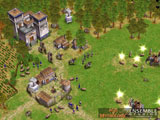 The
emphasis on inter-pantheon deific strife notwithstanding, AoM never
sacrifices an abiding faithfulness to the history and folklore that
records all this mythology. Background given for each myth unit
contextualizes the unit, so that AoM manages to invoke ancient cultures’
lore without thoughtlessly appropriating it or completely butchering its
cultural significance. And the units themselves represent a fascinating
diversity, from Minotaurs and Gorgons to crocodiles that shoot beams of
light from their forehead and giant wolves animated by the spirits of
ancient, powerful warriors. The myth units make a fearsome addition to
any army, yours or the enemy’s, though they can easily be conquered by
plentiful heroes like Arkantos, Ajax, Odysseus, Amanra, and a bevy of
powerful Norse heroes wielding giant hammers and characteristic horned
helmets.
The
emphasis on inter-pantheon deific strife notwithstanding, AoM never
sacrifices an abiding faithfulness to the history and folklore that
records all this mythology. Background given for each myth unit
contextualizes the unit, so that AoM manages to invoke ancient cultures’
lore without thoughtlessly appropriating it or completely butchering its
cultural significance. And the units themselves represent a fascinating
diversity, from Minotaurs and Gorgons to crocodiles that shoot beams of
light from their forehead and giant wolves animated by the spirits of
ancient, powerful warriors. The myth units make a fearsome addition to
any army, yours or the enemy’s, though they can easily be conquered by
plentiful heroes like Arkantos, Ajax, Odysseus, Amanra, and a bevy of
powerful Norse heroes wielding giant hammers and characteristic horned
helmets.
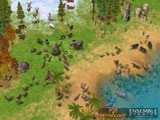 All
of these units are rendered in crisp detail within the game, though cut
scene animations are less impressive. Polygon counts appear to be quite
low in the cut scenes, so that Arkantos’ head looks like a side of
mutton with coals for eyes and epileptic red caterpillars for a mouth.
Continuity between scenarios is also disappointing, as you’ll routinely
win one scenario with a particular group of soldiers only to be given a
completely different army moments later when the next scenario starts.
Transitions between cut scenes and gameplay are, however, nearly
flawless, as the camera zooms out and the units are suddenly under your
command. And the enthusiastic voice acting and well-written dialogue
compensate for what the eye lacks, doing a great deal alone to flesh out
the epic storyline and set up the rigorous challenges presented in each
scenario.
All
of these units are rendered in crisp detail within the game, though cut
scene animations are less impressive. Polygon counts appear to be quite
low in the cut scenes, so that Arkantos’ head looks like a side of
mutton with coals for eyes and epileptic red caterpillars for a mouth.
Continuity between scenarios is also disappointing, as you’ll routinely
win one scenario with a particular group of soldiers only to be given a
completely different army moments later when the next scenario starts.
Transitions between cut scenes and gameplay are, however, nearly
flawless, as the camera zooms out and the units are suddenly under your
command. And the enthusiastic voice acting and well-written dialogue
compensate for what the eye lacks, doing a great deal alone to flesh out
the epic storyline and set up the rigorous challenges presented in each
scenario.
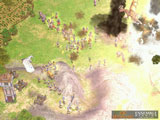 The
scenarios themselves have a scaling difficulty from Easy through Titan,
and difficulty may be set at the beginning of each level. This makes
sense considering the relative ease of some scenarios compared to the
difficulty of later ones. This feature also allows broad possibilities
as far as game time. You can either breeze through all 32 scenarios and
watch Arkantos fight to save Atlantis (though you probably know the
island’s fate), or you can amp up the difficulty and approach each
scenario like a strategic battle for territory, establishing a beach
head and then creeping across the island hill by hill toward the pirate
stronghold and the ultimate battle. Game time for the campaign will
therefore vary from thirty hours to twice that.
The
scenarios themselves have a scaling difficulty from Easy through Titan,
and difficulty may be set at the beginning of each level. This makes
sense considering the relative ease of some scenarios compared to the
difficulty of later ones. This feature also allows broad possibilities
as far as game time. You can either breeze through all 32 scenarios and
watch Arkantos fight to save Atlantis (though you probably know the
island’s fate), or you can amp up the difficulty and approach each
scenario like a strategic battle for territory, establishing a beach
head and then creeping across the island hill by hill toward the pirate
stronghold and the ultimate battle. Game time for the campaign will
therefore vary from thirty hours to twice that.
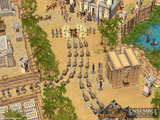 Whatever
your method of play, resource gathering and management remains essential
to building up an army, researching advancements in armor or pickaxe
technology, and ultimately gaining the favor of the gods. Resources
include wood, food, and gold, which must be chopped, hunted or farmed,
or mined. AoM replaces the stone resource from AoK with favor of the
gods, and each civilization gathers favor in a unique way. Greeks must
fall on their knees at the temple, while Egyptians build
ever-more-impressive monuments that gradually accrue favor. Meanwhile,
the Norse fight for the pleasure of their gods, making constant raids on
the enemy vital to building up a powerful army of frost giants and
valkyries. Such differences between civilizations distinguish them from
one another in strategically important ways, giving each unique
strengths and weaknesses.
Whatever
your method of play, resource gathering and management remains essential
to building up an army, researching advancements in armor or pickaxe
technology, and ultimately gaining the favor of the gods. Resources
include wood, food, and gold, which must be chopped, hunted or farmed,
or mined. AoM replaces the stone resource from AoK with favor of the
gods, and each civilization gathers favor in a unique way. Greeks must
fall on their knees at the temple, while Egyptians build
ever-more-impressive monuments that gradually accrue favor. Meanwhile,
the Norse fight for the pleasure of their gods, making constant raids on
the enemy vital to building up a powerful army of frost giants and
valkyries. Such differences between civilizations distinguish them from
one another in strategically important ways, giving each unique
strengths and weaknesses.
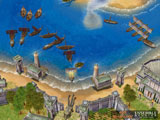 This
becomes important in the multi-player head-to-head or single-player
modes, since selecting the right civilization for your method of play
will mean the difference between dominance and a quick defeat. Single-
and multi-player modes also offer an unlimited amount of game play, and
the style is a nice balance between the spread-and-conquer,
research-and-gather atmosphere of the Civilization series and the
strategic hack-and-slash atmosphere of games like Medieval Total
Warfare, making it possible for players to emphasize either style
according to their own preferences.
This
becomes important in the multi-player head-to-head or single-player
modes, since selecting the right civilization for your method of play
will mean the difference between dominance and a quick defeat. Single-
and multi-player modes also offer an unlimited amount of game play, and
the style is a nice balance between the spread-and-conquer,
research-and-gather atmosphere of the Civilization series and the
strategic hack-and-slash atmosphere of games like Medieval Total
Warfare, making it possible for players to emphasize either style
according to their own preferences.
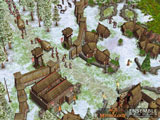 Unfortunately,
if you’re not already a fan of the AoK series, AoM probably won’t change
your mind. But if you liked the series or heard your friends raving
about it and were intrigued, if you enjoy RTS games and
civilization-building resource-management challenges, or if you just
want to see whether Osiris has what it takes to kick Loki’s ass, then
Age of Mythology will not disappoint.
Unfortunately,
if you’re not already a fan of the AoK series, AoM probably won’t change
your mind. But if you liked the series or heard your friends raving
about it and were intrigued, if you enjoy RTS games and
civilization-building resource-management challenges, or if you just
want to see whether Osiris has what it takes to kick Loki’s ass, then
Age of Mythology will not disappoint.
